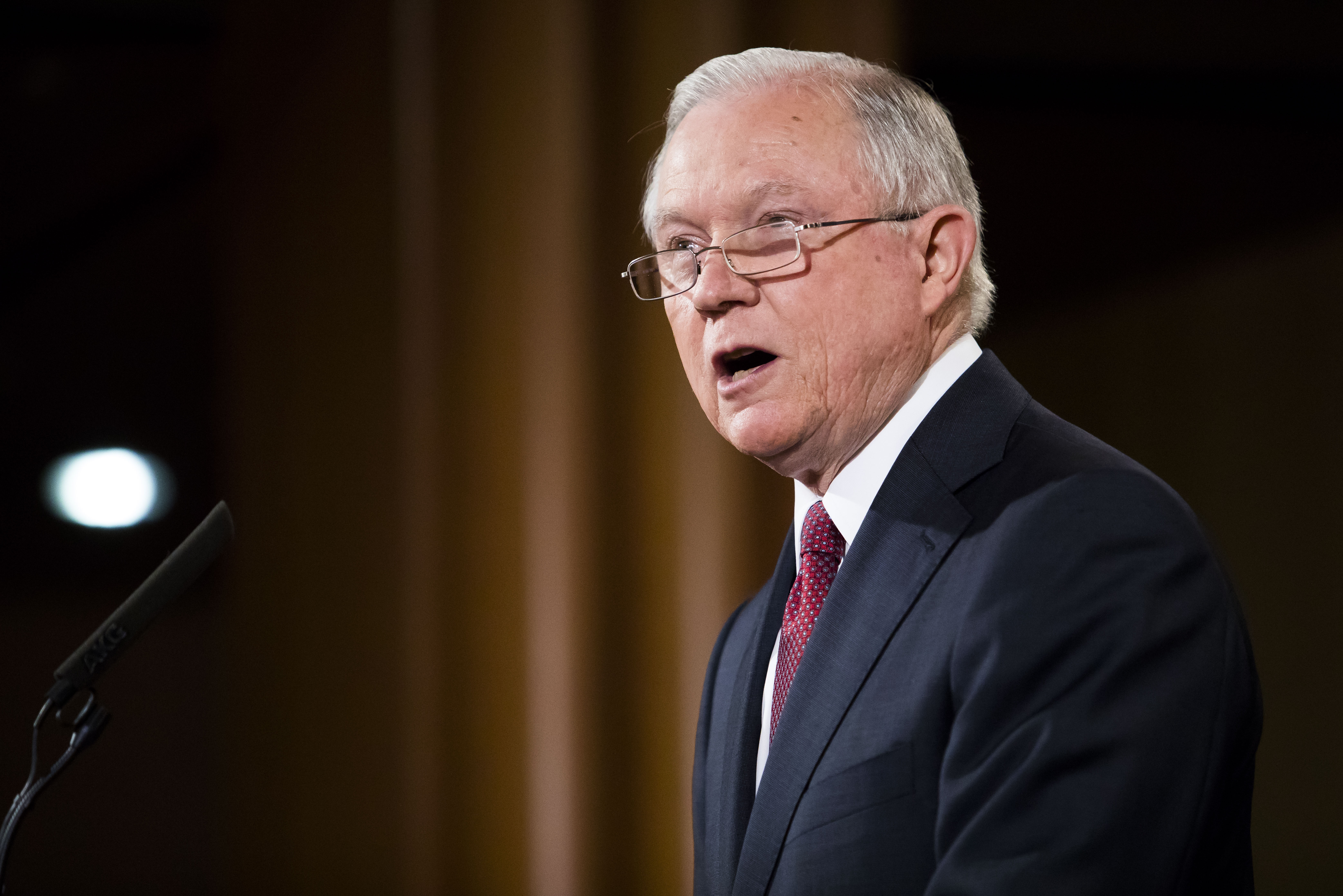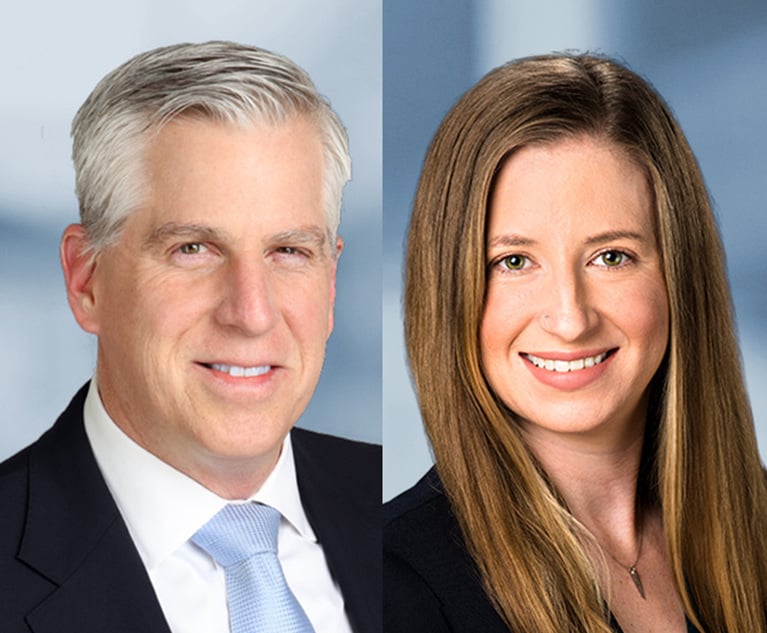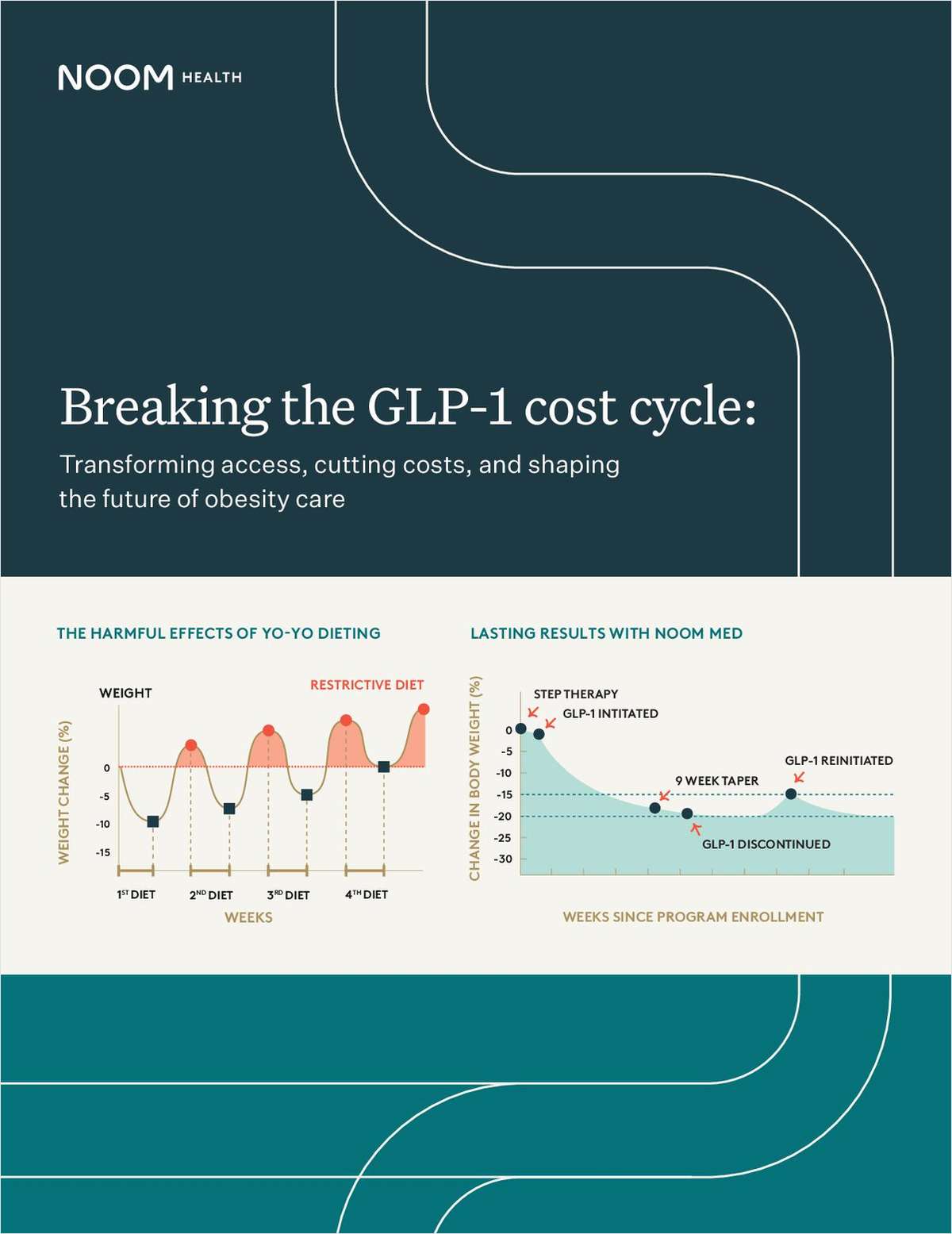DOJ's New FCPA Enforcement Policy: Clarity for Companies and a Warning for Individuals
The new FCPA policy provides the much-needed assurance that fulsome voluntary self-disclosure of FCPA violations will likely serve to avoid criminal prosecution. At the same time, the new FCPA policy signals that the government will continue to combat corporate misconduct by focusing on individual misconduct.
January 30, 2018 at 01:42 PM
7 minute read
 Attorney General Jeff Sessions has called FCPA enforcement a “critical” mission of the Trump administration.
Attorney General Jeff Sessions has called FCPA enforcement a “critical” mission of the Trump administration.
Telia Company AB was fined more than $730 million for Foreign Corrupt Practices Act (FCPA) violations in 2017, Haliburton, nearly $30 million and Mondelez International, $13 million. Other examples abound. Given these staggering penalties, the announcement late last year that the Department of Justice was issuing a revised FCPA Corporate Enforcement Policy creating a presumption in favor of declination for companies voluntarily disclosing FCPA violations was welcome news. The new FCPA policy provides the much-needed assurance that fulsome voluntary self-disclosure of FCPA violations will likely serve to avoid criminal prosecution. At the same time, the new FCPA policy signals that the government will continue to combat corporate misconduct by focusing on individual misconduct, an approach unveiled during the previous administration through the “Yates Memo.” Finally, by clearly recognizing the benefits of incentivizing voluntary disclosure, the DOJ (and perhaps other federal agencies) may be moving closer to a formal nonprosecution policy in other areas, thus eliminating the existing uncertainty about the benefits of a voluntary disclosure.
The New FCPA Policy
In recent years, FCPA enforcement has been a DOJ priority. At the beginning of 2016, it was reported that 40 new lawyers and FBI agents had been dedicated to foreign-bribery probes. The DOJ also launched a pilot program that allowed prosecutors to consider prosecution declinations for companies that self-disclosed FCPA violations. And in April 2017, U.S. Attorney General Jeff Sessions identified enforcement of the FCPA as a “critical” initiative of the Trump administration.
The FCPA policy is the DOJ's newest weapon aimed at combating bribery and foreign corruption. Corporations are now squarely on the front lines of that battle, as they stand to be rewarded for robust compliance programs that detect FCPA violations and voluntarily disclosing violations to the government. Under the new policy, there is a rebuttable presumption that the DOJ will decline prosecution of companies that voluntarily self-disclose potential violations of the FCPA, “fully cooperate” with the DOJ's investigation, and remediate any misconduct. Moreover, to overcome that presumption, the government must show that there are “aggravating circumstances” that warrant criminal prosecution, including involvement by company executives in the misconduct, a significant profit from the misconduct, pervasiveness of the misconduct within the company and a history of misconduct.
To qualify for favorable treatment, a company must self-disclose “prior to an imminent threat of disclosure or government investigation.” A company's compliance with the DOJ's investigation must be “proactive … rather than reactive” and it must remediate “appropriately.” “Appropriate” remediation includes an analysis of the causes of the underlying conduct, implementation of an effective compliance and ethics program, discipline of employees responsible for the misconduct, and retention of business records. The company must also pay all disgorgement, forfeiture, and/or restitution resulting from the misconduct.
Even when criminal prosecution is warranted for a company that otherwise qualifies under the program, prosecutors will recommend a 50 percent reduction from the low end of the federal sentencing guidelines fine range and will generally not require appointment of a monitor if the company has already implemented an effective compliance program.
Finally, even if a company fails to voluntarily disclose its misconduct, it qualifies for a 25 percent reduction off the low end of the fine range if it fully cooperates with the DOJ's investigation and timely and appropriately remediates.
Voluntary Self-Disclosure in Other Enforcement Areas
While other federal agencies hold out the possibility that self-disclosure will lead to nonprosecution, only a few make that explicit. For example, just last year, the DOJ's National Security Division issued a memorandum stating that companies are eligible for a range of benefits, including the possibility of a nonprosecution agreement, in exchange for self-disclosing violations of the export-control and sanctions laws under the Arms Export Control Act (AECA) and the International Emergency Economic Powers Act (IEEPA). Moreover, for decades, the Tax Division has had an informal policy that offers the possibility of nonprosecution in exchange for voluntary disclosure.
But unlike the FCPA policy, these voluntary disclosure policies give prosecutors the option not to prosecute companies that disclose misconduct. They do not create a presumption of declination, which gives companies the strongest incentive to report misconduct. Now that the DOJ has adopted a presumption for FCPA enforcement, should we expect it to adopt the same policy in other enforcement areas?
A distinct possibility to be sure. But there are reasons to believe that programs with favorable presumptions will be limited. First, as discussed above, the administration has identified FCPA enforcement as an important initiative. The FCPA policy, which seeks to enhance FCPA enforcement, is consistent with that objective. Second, the introduction to the FCPA policy notes the “unique issues presented in FCPA matters,” including “their inherently international character.” This may reflect a judgment by the administration that other areas of enforcement, like tax and securities fraud, do not need the same policy in order to hold individuals accountable.
Even if the DOJ does not extend the policy, the FCPA policy may still inform how prosecutors view companies that self-disclose wrongdoing in other enforcement areas. The FCPA policy provides details concerning what a robust self-disclosure should look like. It describes what full cooperation with the government includes and gives context to what a timely and meaningful remediation program should include. It is likely that prosecutors in other enforcement areas will look to the standards of the FCPA policy when deciding whether to grant declinations under other self-disclosure policies.
An Extension of the Yates Memorandum?
In September 2015, then-Deputy Attorney General Sally Yates issued a memorandum on “Individual Accountability for Corporate Wrongdoing” that was widely understood as a response to criticism that the DOJ failed to prosecute individuals responsible for the 2008 financial crisis. The Yates Memo instructed DOJ attorneys to “focus on individuals from the inception of the investigation” and required companies to “identify all individuals involved in or responsible for the misconduct at issue” in order to receive cooperation credit. Some close followers of the DOJ have concluded that since the Yates Memo was issued, the agency has in fact focused on individual misconduct when investigating and resolving cases of corporate wrongdoing.
Just a few months ago, Deputy AG Rod Rosenstein questioned whether the Yates Memo would continue to guide the DOJ's efforts to fight corporate crime. But, by adopting the FCPA policy, the administration signaled that in its view the Yates Memo still offers the best approach to deterring corporate crime. During his announcement of the new policy, Rosenstein stated clearly that “effective deterrence of corporate corruption requires prosecution of culpable individuals.” He highlighted the fact that 19 individuals either pleaded guilty or were convicted in FCPA-related cases up to that point in 2017. The goal of the FCPA policy, according to Rosenstein, is to “increase the volume of voluntary disclosures, and enhance our ability to identify and punish culpable individuals.”
Conclusion
One thing is clear: the FCPA policy demonstrates that the DOJ's interest in combating foreign corruption and bribery is as strong as ever. The DOJ is enlisting the cooperation of business to police itself. Companies that suspect that their employees are bribing foreign officials now have a powerful incentive to conduct investigations and disclose those instances to the DOJ. The new program is also a warning to individuals who violate the law—both the FCPA and potentially other criminal statutes—that the DOJ is willing to take unprecedented measures to hold them accountable.
Joe Martini, James Glasser and Judd Lindenfeld are with Wiggin & Dana.
This content has been archived. It is available through our partners, LexisNexis® and Bloomberg Law.
To view this content, please continue to their sites.
Not a Lexis Subscriber?
Subscribe Now
Not a Bloomberg Law Subscriber?
Subscribe Now
NOT FOR REPRINT
© 2025 ALM Global, LLC, All Rights Reserved. Request academic re-use from www.copyright.com. All other uses, submit a request to [email protected]. For more information visit Asset & Logo Licensing.
You Might Like
View All

Federal Judge Approves Harvard's Dismissal of Chip-Patent Suit Against Samsung
2 minute read

Connecticut Movers: New Associates in Stamford and a Head of Business in Vernon
2 minute readTrending Stories
- 1Gunderson Dettmer Opens Atlanta Office With 3 Partners From Morris Manning
- 2Decision of the Day: Court Holds Accident with Post Driver Was 'Bizarre Occurrence,' Dismisses Action Brought Under Labor Law §240
- 3Judge Recommends Disbarment for Attorney Who Plotted to Hack Judge's Email, Phone
- 4Two Wilkinson Stekloff Associates Among Victims of DC Plane Crash
- 5Two More Victims Alleged in New Sean Combs Sex Trafficking Indictment
Who Got The Work
J. Brugh Lower of Gibbons has entered an appearance for industrial equipment supplier Devco Corporation in a pending trademark infringement lawsuit. The suit, accusing the defendant of selling knock-off Graco products, was filed Dec. 18 in New Jersey District Court by Rivkin Radler on behalf of Graco Inc. and Graco Minnesota. The case, assigned to U.S. District Judge Zahid N. Quraishi, is 3:24-cv-11294, Graco Inc. et al v. Devco Corporation.
Who Got The Work
Rebecca Maller-Stein and Kent A. Yalowitz of Arnold & Porter Kaye Scholer have entered their appearances for Hanaco Venture Capital and its executives, Lior Prosor and David Frankel, in a pending securities lawsuit. The action, filed on Dec. 24 in New York Southern District Court by Zell, Aron & Co. on behalf of Goldeneye Advisors, accuses the defendants of negligently and fraudulently managing the plaintiff's $1 million investment. The case, assigned to U.S. District Judge Vernon S. Broderick, is 1:24-cv-09918, Goldeneye Advisors, LLC v. Hanaco Venture Capital, Ltd. et al.
Who Got The Work
Attorneys from A&O Shearman has stepped in as defense counsel for Toronto-Dominion Bank and other defendants in a pending securities class action. The suit, filed Dec. 11 in New York Southern District Court by Bleichmar Fonti & Auld, accuses the defendants of concealing the bank's 'pervasive' deficiencies in regards to its compliance with the Bank Secrecy Act and the quality of its anti-money laundering controls. The case, assigned to U.S. District Judge Arun Subramanian, is 1:24-cv-09445, Gonzalez v. The Toronto-Dominion Bank et al.
Who Got The Work
Crown Castle International, a Pennsylvania company providing shared communications infrastructure, has turned to Luke D. Wolf of Gordon Rees Scully Mansukhani to fend off a pending breach-of-contract lawsuit. The court action, filed Nov. 25 in Michigan Eastern District Court by Hooper Hathaway PC on behalf of The Town Residences LLC, accuses Crown Castle of failing to transfer approximately $30,000 in utility payments from T-Mobile in breach of a roof-top lease and assignment agreement. The case, assigned to U.S. District Judge Susan K. Declercq, is 2:24-cv-13131, The Town Residences LLC v. T-Mobile US, Inc. et al.
Who Got The Work
Wilfred P. Coronato and Daniel M. Schwartz of McCarter & English have stepped in as defense counsel to Electrolux Home Products Inc. in a pending product liability lawsuit. The court action, filed Nov. 26 in New York Eastern District Court by Poulos Lopiccolo PC and Nagel Rice LLP on behalf of David Stern, alleges that the defendant's refrigerators’ drawers and shelving repeatedly break and fall apart within months after purchase. The case, assigned to U.S. District Judge Joan M. Azrack, is 2:24-cv-08204, Stern v. Electrolux Home Products, Inc.
Featured Firms
Law Offices of Gary Martin Hays & Associates, P.C.
(470) 294-1674
Law Offices of Mark E. Salomone
(857) 444-6468
Smith & Hassler
(713) 739-1250










